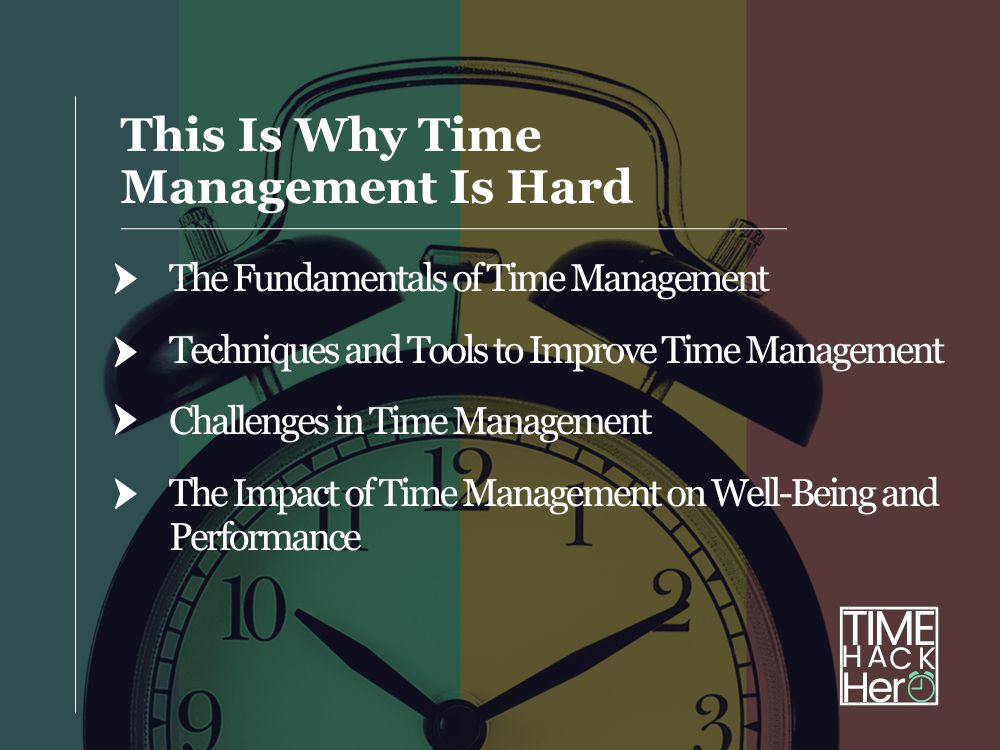In today’s fast-paced world, effective time management has become increasingly challenging. With multiple tasks and a never-ending influx of information vying for our attention, it’s no surprise that managing one’s own schedule can feel extremely daunting. As our lives continue to become more complex and integrated, the pursuit of optimal time management often proves to be an overwhelming task, but understanding why time management is difficult can help improve your productivity.
One reason behind the difficulty of time management is the lack of clear goals and priorities. Without a genuine purpose or an understanding of which tasks to prioritize, it can become difficult to stay focused and disciplined. This often stems from poor organization skills, where failure to properly structure time or create well-defined daily routines leads to counterproductive practices. Furthermore, our increasingly digital world exacerbates this problem, with countless distractions available at our fingertips, making it even harder to maintain a consistent work schedule.
Another aspect contributing to the complexity of time management is the need to adapt to ever-changing environmental conditions. Fluctuations in personal and professional lives, shifting priorities, and unforeseen events can all result in the need for continuous adjustments to our daily routines. This requires the development of specific skills such as flexibility and adaptability to remain efficient in managing our time, further emphasizing the challenge of achieving effective time management practices.
Table of Contents
The Fundamentals of Time Management
Understanding Time Management
Time management is the process of organizing and planning how to allocate your time effectively to achieve specific goals. It involves developing the right habits and making better choices to increase productivity and efficiency. By implementing time management strategies, you can accomplish more in less time, reduce procrastination, boost your confidence, and advance your career or education.
Prioritizing and Setting Goals
Prioritizing and setting goals are essential aspects of effective time management. To begin, create a list of tasks and rank them based on their importance and deadlines. Break down larger tasks into smaller, more manageable steps. By doing so, you can focus on high-priority tasks and ensure that you allocate appropriate time and effort to them. Here are some techniques to help prioritize:
- The Eisenhower Matrix: This method separates tasks into four categories: urgent and important, important but not urgent, urgent but not important, and not urgent and not important.
- The ABCDE Method: Assign each task a letter (A to E) based on priority, with A being the highest priority tasks and E being the least important.
- The Time Management Quadrants: Prioritize tasks based on the amount of time and effort required (quick wins, major projects, fill-ins, and time-wasters).
Scheduling Techniques
To effectively manage your time, adopt scheduling techniques that best suit your work style and requirements. Some popular scheduling methods include:
- Calendars: Use a digital or physical calendar to record deadlines, appointments, and other essential events. Manage your time by blocking periods for specific tasks and avoiding overbooking or double-booking activities.
- To-do Lists: Compile daily, weekly, or monthly lists of tasks and check them off as they’re completed. This helps ensure that nothing falls through the cracks and can provide a sense of accomplishment as you progress through your list.
- Time Blocking: Divide your day into smaller, focused time blocks to dedicate to specific activities. This allows for greater focus on individual tasks and can lead to increased productivity and efficiency.
In conclusion, mastering the fundamentals of time management, such as understanding the concept, prioritizing and setting goals, and implementing scheduling techniques, is essential for achieving better results in both professional and personal aspects of life.
Techniques and Tools to Improve Time Management
To-Do Lists
Creating a to-do list is an effective way to prioritize tasks and organize your day. By listing down your tasks based on their importance, you can ensure your focus remains on what matters most. To create a to-do list:
- Write down all the tasks you need to accomplish during the day
- Prioritize tasks based on importance and deadlines
- Update the list throughout the day as new tasks arise or existing ones are completed.
Calendar and Planning
Using a calendar to plan your day can help you visualize your time and allocate it more effectively. Whether it’s a physical calendar or a digital one, the key is to:
- Block out time for both personal and professional activities
- Schedule important and non-negotiable commitments first
- Set realistic timeframes for each task
- Avoid overbooking your schedule to allow for unexpected events.
Effective Task Delegation
Delegating tasks can free up time for more important tasks and create a more efficient workflow. Some strategies for successful delegation include:
- Identifying tasks that can be delegated to others
- Clearly defining goals and expectations for the task
- Providing appropriate resources and tools to complete the task
- Monitoring progress and providing feedback when necessary.
Pomodoro Technique
The Pomodoro technique is a time management method that breaks work into focused 25-minute intervals, called “Pomodoros,” with short breaks in between. For each Pomodoro:
- Choose a task to work on and set a timer for 25 minutes
- Work on the task without distractions, such as social media or emails
- Take a 5-minute break after each Pomodoro, and a 15-30 minute break after completing four Pomodoros.
Time Management Apps
Technology can also play a role in improving your time management skills. Various time management apps are available to help:
- Track time spent on tasks
- Set and monitor deadlines
- Create to-do lists
- Manage calendars and schedules
- Block distracting apps and websites.
Some popular time management apps include Toggl, Asana, Todoist, and RescueTime. Investigate the features and pricing of these apps to find the one that is most suitable for your needs.
Challenges in Time Management
Managing Distractions and Interruptions
Distractions and interruptions are significant challenges to effective time management. They can come from various sources, such as phone notifications, social media, or unexpected requests from clients or colleagues. To manage these distractions, it’s essential to prioritize tasks and set specific times for dealing with non-urgent matters, allowing for better concentration on the task at hand.
- Turn off or silence notifications during focused work periods
- Allocate specific times for checking emails and messages
- Politely inform clients or colleagues when you’re unavailable and when you’ll be able to address their concerns
The Role of Procrastination and Multitasking
Procrastination is another common challenge in time management. It often results from an inclination to avoid difficult or time-consuming tasks, prioritizing easier or more enjoyable activities instead. Consequently, critical tasks may be left incomplete. Additionally, multitasking can lead to decreased productivity and increased stress, as individuals attempt to juggle multiple tasks simultaneously. To combat procrastination and over-multitasking:
- Break down larger tasks into smaller, more achievable steps
- Set deadlines and stick to them
- Focus on one task at a time before moving on to the next
Balancing Work Environment and Social Norms
The work environment and social norms can also impact time management. In some situations, employees might feel compelled to conform to expectations, such as working late or attending social events, even when it conflicts with their personal schedules and priorities. This can lead to a mismanagement of time and an imbalance between work and personal life. To navigate these challenges:
- Set clear boundaries regarding work hours and personal commitments
- Communicate your priorities with both supervisors and colleagues
- Create a comfortable workspace that promotes productivity
The Impact of Time Management on Well-Being and Performance
Physical and Mental Well-Being
Time management has been found to be moderately related to job performance, academic achievement, and well-being1. In particular, it has a 72% stronger impact on life satisfaction than job satisfaction2. Good time management can reduce stress and increase overall well-being by allowing individuals to feel more in control of their daily schedules.
- Productivity: By efficiently organizing and prioritizing tasks, individuals can boost their productivity and avoid burnout.
- Awareness: Time management helps create awareness of one’s habits, strengths, and weaknesses, leading to personal growth and development.
- Well-being: Proper time management can create a sense of balance, enhancing physical and mental well-being.
Increasing Personal and Professional Productivity
Strategic time management practices can have a noticeable impact on personal and professional productivity. Some ways in which time management supports productivity are:
- Engagement: Effective time management encourages individuals to stay engaged, focused, and passionate about their work.
- Efficiency: Prioritizing tasks and setting realistic deadlines can help individuals achieve more in less time.
- Performance: As a result of better organization and focus, individuals experience improved overall performance in both personal and professional aspects of their lives.
Developing Responsibility and Willpower
In addition to its impact on well-being and productivity, time management plays a significant role in developing responsibility and willpower:
- Responsibility: Time management requires individuals to set priorities, manage deadlines, and be accountable for their decisions.
- Willpower: Effective time management demands persistence, self-discipline, and the ability to resist distractions, leading to the development of strong willpower.
- Freedom: Developing responsibility and willpower through time management can ultimately lead to a greater sense of freedom, as individuals gain more control over their lives.









